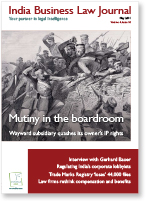Goodwill and trust are vital assets of any company or organization
This is the raison d’être of the Edelman Trust Barometer, a 23-country study that tracks attitudes towards institutions and sources of information. Earlier this year, the barometer found that 77% of Indians trust businesses in the country to do the right thing.
When it comes to having faith in a brand, however, Indian companies fare less well. While Nokia tops a recent list of brands trusted most by Indian consumers, only one Indian brand – Tata – makes it into the top five. According to The Brand Trust Report, India Study 2011, the other three brands held in such high esteem are Sony, LG and Samsung.
Does this bode well for India’s brands? And do efforts to protect a brand have any bearing on the trust it commands?
Questions such as these will no doubt weigh heavily on the minds of delegates at the International Trademark Association’s (INTA’s) 133rd annual meeting, which takes place in San Francisco from 14 to 18 May. India Business Law Journal and its sister publication China Business Law Journal are proud to be media sponsors of this event, where copies of both magazines will be distributed widely.
Of particular interest to delegates at INTA will be our exclusive interview with the association’s president, Gerhard Bauer (Brand awareness, page 35). Talking to India Business Law Journal’s editor, Vandana Chatlani, Bauer discusses the opportunity for India’s brands to go global, as well as the hurdles that face international IP owners in India. He is optimistic about the future of Indian brands and urges the country to embrace a “global brand world”.

An appeal is underway and the dispute is far from over. Yet the question on most observers’ minds is how did the German company lose control of its Indian subsidiary to such an extent that the subsidiary was able to attack – and ultimately quash – 12 patents that were owned by its controlling shareholder?
Part of the answer may be found in comments made by Enercon’s lawyer, Rainer Böhm of Eisenführ Speiser in Hamburg. Böhm explains that when the subsidiary was established, Enercon had “more limited management capacity,” and that “it trusted its local partner to keep their best common interest in mind”.
Was this trust misplaced? And when the courts have finally spoken, will it become apparent that a little hard-headed cynicism might have helped the German company? Only time will tell, but what does seem certain is that observers will be monitoring the case closely for some time to come.
A company that has had a somewhat smoother ride in India is Hilton. Writing in this month’s Vantage point (Welcome improvements, page 21), Mark Robertson, a senior vice-president of Hilton Worldwide, discusses his company’s experience of protecting and enforcing its intellectual property rights in the country. Robertson praises recent upgrades to India’s IP regime and looks forward to continued efforts to bring greater uniformity to the country’s court system.
In recent weeks, however, events at the country’s Trade Marks Registry may well have shaken his confidence. As we reveal in the first of this month’s Spotlights (Missing in action, page 23), the registry’s offices in Mumbai, Delhi, Chennai, Kolkata and Ahmedabad have together lost more than 44,000 files. In one fell swoop, India has cast doubt on the effectiveness of its efforts to upgrade its IP machinery.
The resulting loss of trust is compounded by a series of corruption scandals that have rocked other divisions of the government and civil service. Public outrage at some of these scandals has placed the spotlight on a sinister form of lobbying, in which seasoned professionals are paid large sums of money to influence key decisions, often through the use of questionable methods (Policing the puppet masters, page 39). Unlike many other countries, India has no regulatory framework or disclosure requirements for its lobbying industry and there are increasing calls for it to be held to account. Opinions on the virtue of new regulations are divided, but the fact that it is being discussed at all is a positive step.
This month’s Intelligence report (Competitive rewarding, page 43) is an in-depth survey of Indian lawyers’ salaries and career prospects. Our analysis finds that a large number of law firms are rethinking their approaches to compensation and benefits, and, spurred on by the country’s law firm consultants, many are beginning to embrace the concept of equity partnerships.
Such a move may help to build the brands of the country’s largest law firms. For at the moment, most observers agree, the strongest brands in India’s legal profession are not law firms, but individual lawyers.


























